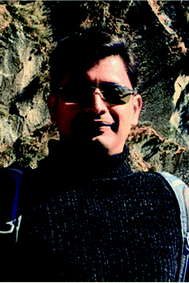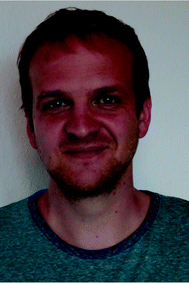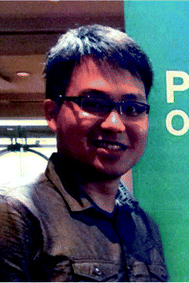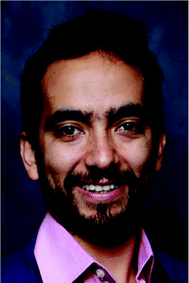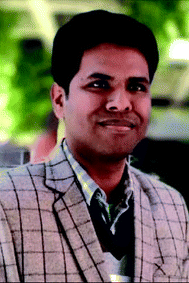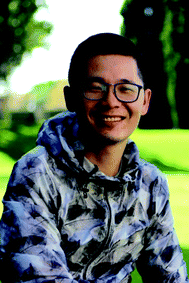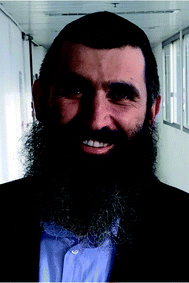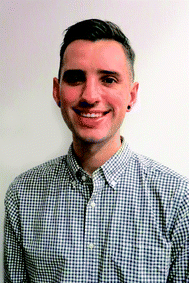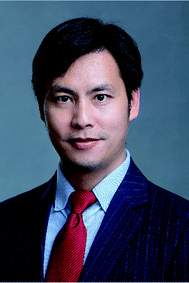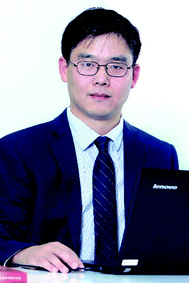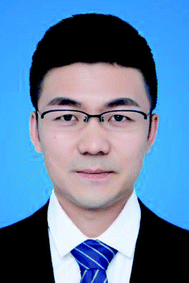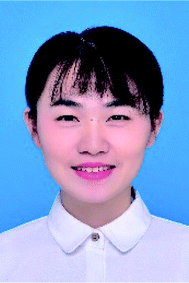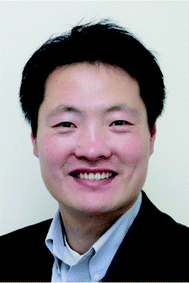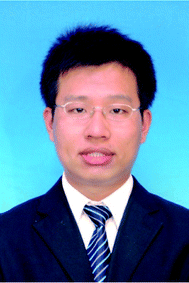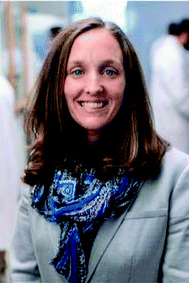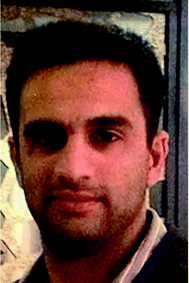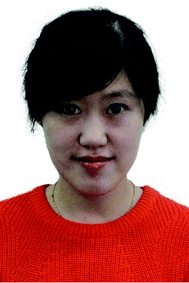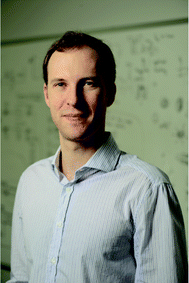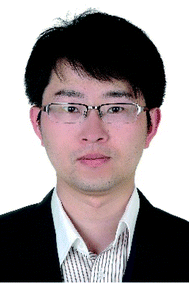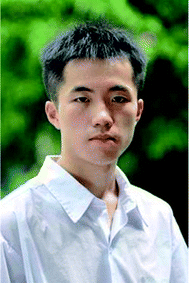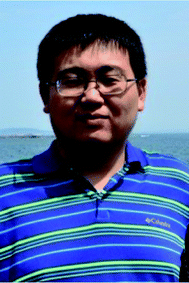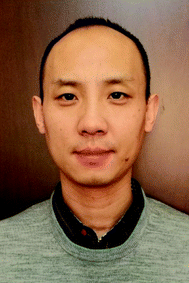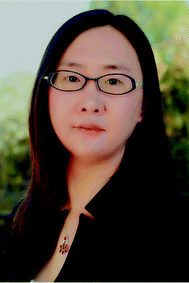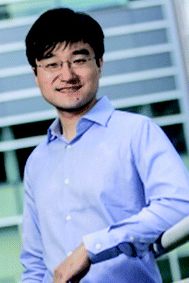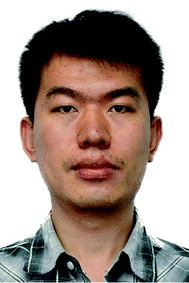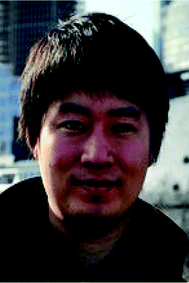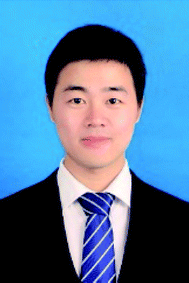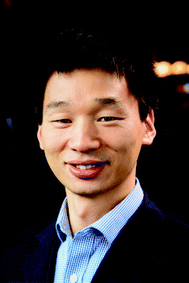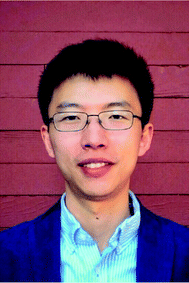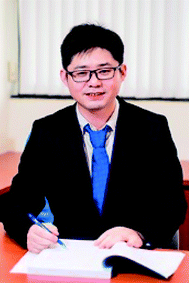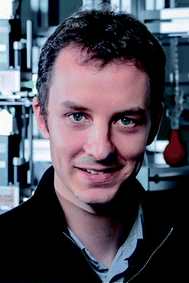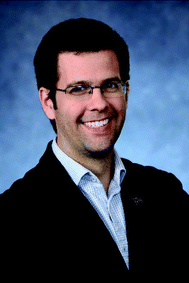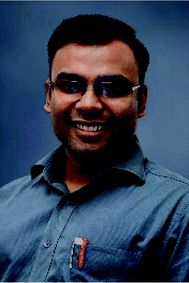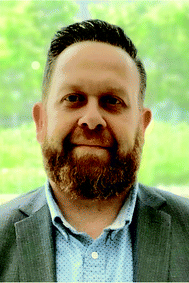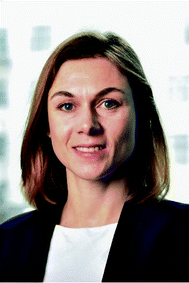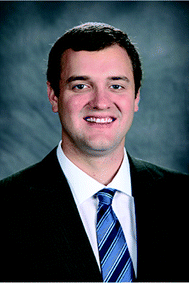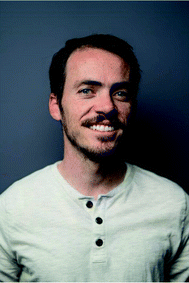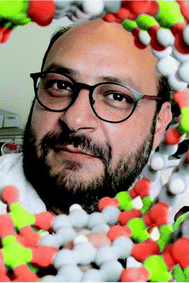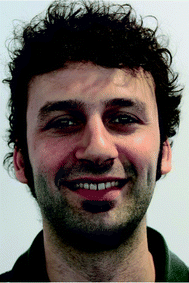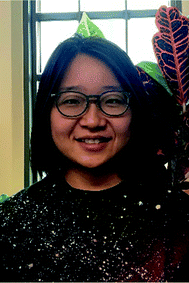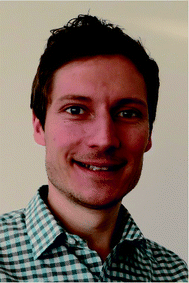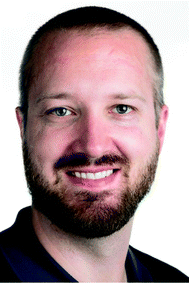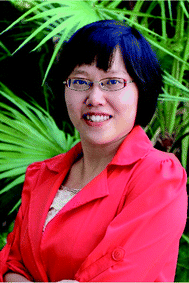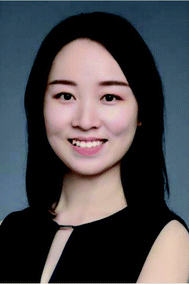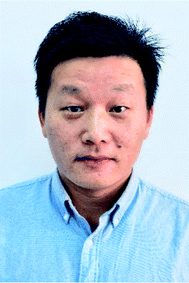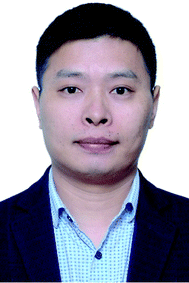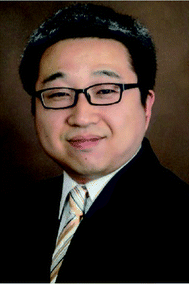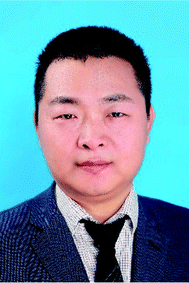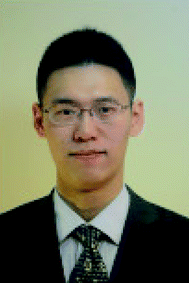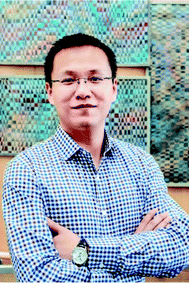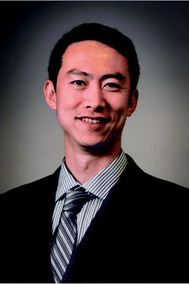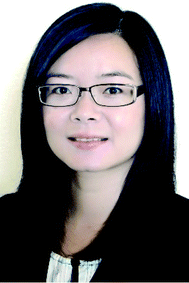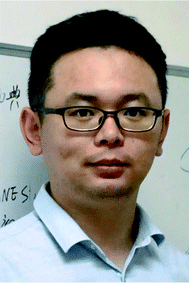DOI:
10.1039/C9TA90245G
(Profile)
J. Mater. Chem. A, 2019,
7, 23267-23279
Journal of Materials Chemistry A profiles: contributors to the Emerging Investigators 2019 issue
Abstract
Our 2019 Emerging Investigators themed issues gather some of the best research being conducted by scientists in the early stages of their independent career. Each contributor was recommended as carrying out work with the potential to influence future directions in materials chemistry. Congratulations to all of the researchers featured, we hope you enjoy reading this issue.
Hailing from the eastern Indian province of Odisha, Dr Prabeer Barpanda completed his B.Eng. (Ceramics) at National Institute of Technology Rourkela, India. With a British Chevening Fellowship, he obtained an M.Phil. degree at the University of Cambridge (Wolfson College). He completed doctorate research at Rutgers University, New Jersey, USA. Following this, he pursued postdoctoral training at the Universite de Picardie Jules Verne, France. With a JSPS Fellowship, he joined the University of Tokyo for his second postdoctoral training. Since 2013, he has been directing his research group (Faraday Materials Laboratory) focusing on materials synthesis, crystal structure and electrochemical investigation of inorganic insertion materials.
Dr Ben Breitung received his Ph.D. in Inorganic Chemistry from the Institute for Inorganic Chemistry/Karlsruhe Institute of Technology (KIT) in 2013. After postdoctoral years spent at the BASF/KIT Joint Laboratory BELLA (Battery and Electrochemistry Laboratory), he started his habilitation at TU Darmstadt under the supervision of Prof. Horst Hahn. Since 2017, he has been a group leader at the Institute of Nanotechnology (INT) of KIT. His work comprises the preparation and characterization of high entropy materials for energy storage as well as the development of materials and processes for printed electronics.
Dr Amparo Ruiz Carretero is a “Chargé de Recherche” at Institute Charles Sadron (CNRS) in Strasbourg (France). She studied Chemistry at the University of Castilla – La Mancha (Spain), where she obtained her Ph.D. in 2009 under the supervision of Prof. A. de la Hoz and Dr A. Sánchez. She spent a big part of her Ph.D. in the group of Prof. E. W. Meijer and Prof. A. Schenning. After postdocs in the groups of Prof. S. Stupp (Northwestern University) and Prof. L. De Cola (University of Strasbourg), she obtained her current CNRS position in 2015. Her research interests include the study of hydrogen-bonded semiconductors, supramolecular chirality and the influence of magnetic fields in organic electronics.
Dr Teng-Hao Chen is an Assistant Professor at the Department of Chemistry at Tamkang University, Taiwan. He received his B.Sc. in Chemistry from National Taiwan University, and his Ph.D. from the University of Houston working with Prof. Ognjen Š. Miljanić (2014). He was a postdoctoral fellow at the University of California, San Diego with Prof. Seth Cohen (2015–2016). His current research is focused on the design and synthesis of novel functional porous materials, including metal–organic frameworks, covalent organic frameworks, and noncovalent organic frameworks, for applications in energy storage and molecular separation.
Dr Juan-Pablo Correa-Baena is an Assistant Professor at the Georgia Institute of Technology. His group focuses on the understanding and control of electronic dynamics at the nanoscale for low-cost semiconductors. Specifically, his group studies new deposition approaches with nanoscale control of halide perovskites and related materials, and synchrotron-based characterization techniques to understand fundamental limitations of solar cells and light emitting diodes. Prof. Correa-Baena received his Ph.D. from the University of Connecticut and was a postdoctoral fellow at the Ecole Polytechnique Fédérale de Lausanne and the Massachusetts Institute of Technology, where his contributions helped boost the efficiencies of perovskite solar cells above 25%.
Dr Ramendra Sundar Dey is a Scientist at the Institute of Nano Science and Technology, Mohali, India. Prior to this, he was a Hans C. Ørsted postdoc fellow at the Technical University of Denmark (DTU), Denmark. He received a Ph.D. in Chemistry in 2013 from Indian Institute of Technology (IIT) Kharagpur, India. Over the past 6 years he has been involved in research in the field of electroanalytical chemistry in nanotechnology. His current research is focused on the architecture and engineering of carbonaceous materials for advanced energy storage technology and non-novel metal catalysts for hybrid energy systems. Dr Dey has published more than 25 research articles, a book chapter and filed one patent. He has been honored with a number of prestigious national and international awards.
Dr Xiaoguang Duan received his Ph.D. in Chemical Engineering from Curtin University (Australia) in 2016. He currently works as a University Research Fellow at the School of Chemical Engineering and Advanced Materials, The University of Adelaide (Australia). He has been dedicated to the development of advanced nanomaterials for environmental remediation and probing the mechanistic insights of carbocatalysis in green chemistry. He received the
ACS Catalysis Early Career Researcher Award and was listed on the 2018 Australian Research Early Career Leaderboard.
Dr David Eisenberg is an Assistant Professor at the Schulich Faculty of Chemistry, Technion–Israel Institute of Technology. He studied physical organic chemistry at the Hebrew University of Jerusalem, with Prof. Roy Shenhar and Prof. Mordecai Rabinowitz. In parallel, he worked in an Advanced Materials department at an Israeli National Lab, winning prizes for his academic and industrial research. He travelled to the University of Texas at Austin as a Fulbright Fellow and an Ilan-Ramon Fellow, to study electrocatalysis with Prof. Allen J. Bard and Prof. Adam Heller. He then moved to the group of Prof. Gadi Rothenberg (University of Amsterdam) to develop self-templated carbon materials for energy applications. Since 2017, he leads the Eisenberg Lab for Electrochemistry and Energy, focused on electrocatalysis in the nitrogen and oxygen cycles, and the rational design of nanostructure in catalytic materials. He lives in Migdal HaEmeq, Israel, with his wife and 5 children, thanking G-d daily for this wonderful, wonderful world.
Dr Jack Evans was born in Adelaide, South Australia, and completed B.Sc. (Hons) and Ph.D. degrees at the University of Adelaide. After finishing his Ph.D., he joined Dr François-Xavier Coudert as a postdoctoral researcher at Chimie ParisTech. Jack’s research interests aim to improve our understanding of the chemical and physical properties of emerging and fascinating materials using theoretical methods across a variety of scales – from simulations of electronic structure to the mechanics of an entire solid. Since 2017, Jack has worked with Professor Stefan Kaskel at Technische Universität Dresden where he was recently awarded an Alexander von Humboldt postdoctoral research fellowship.
Dr Xiaobin Fan is currently a professor and the vice dean of the School of Chemical Engineering & Technology at Tianjin University, China. His current research interests focus on the preparation and applications of two-dimensional materials. After receiving his Ph.D. in 2009, he has published more than 110 scientific papers, and these studies have been cited more than 4500 times. He was awarded Scientific and Technological Innovation Leading Talents of China in 2018, the Young Scholar of Chang Jiang Scholars Program (China) in 2016, and the NSFC Outstanding Young Scholar Award (China) in 2012.
Dr Meng Gu is an Associate Professor in the Department of Materials Science and Engineering in the Southern University of Science and Technology. His team specializes in probing the structure–property relationships of energy-related materials using
in situ/aberration-corrected scanning transmission electron microscopy. Dr Gu received his Ph.D. degree (2011) in materials science in the University of California Davis. After joining the EMSL in Pacific Northwest National Laboratory, his research focused on the study of energy materials including battery materials and catalysts. Dr Gu joined Dow Corning in Michigan as a core R&D materials scientist in February 2014 focusing on the development of industrial catalysts, and advanced microscopy analysis of reactions. He has 102 peer-reviewed journal publications including
Energy & Environmental Science,
Nature Communications,
Physical Review Letters,
Nano Letters,
Journal of Materials Chemistry A,
Advanced Materials,
ACS Nano,
Angewandte Chemie,
Nano Energy,
ACS Catalysis,
Chemistry of Materials,
Applied Physics Letters,
Ultramicroscopy,
Journal of Electrochemical Society,
etc. His publications have been cited more than 6500 times, and have been highlighted by the U.S. DOE, PNNL, SLAC national lab, London Center for Nanotechnology, Imperial College London and other social media. Dr Gu has been awarded the Albert CREWE award from the Microscopy Society of America on Aug 2
nd 2015 for his outstanding research.
Dr Shaohua Guo received his PhD from the University of Tsukuba in 2015, and then worked as a postdoctoral researcher at the National Institute of Advanced Industrial Science and Technology (AIST). He is currently an associate professor in College of Engineering and Applied Sciences, Nanjing University. His research interests involve energy materials and chemistry for lithium-ion batteries, sodium-ion batteries, and solid-state batteries. He has published over 50 peer-reviewed papers in
Energy & Environmental Science,
Nat. Commun.,
Angew. Chem. Int. Ed.,
Adv. Mater. and so on.
Dr Cuiping Han received her B.S. degree from China University of Petroleum (Huadong) in 2010 and Ph.D. degree from Tsinghua University in 2015 with Prof. Baohua Li. She visited Georgia Institute of Technology during 2014–2015 as a visiting scholar in the group of Prof. Zhiqun Lin. Then she worked as a postdoc with Prof. Ching-Ping Wong at the Chinese University of Hong Kong under the support of the Xiangjiang scholar program during 2015–2017. Now she is a research associate at Shenzhen University. Her research is focused on electrode materials for lithium-ion batteries and supercapacitors and their hybrid devices. She has published 1 book and more than 30 peer-reviewed papers.
Dr Tae Hee Han is an Associate Professor in the Department of Organic and Nano Engineering at Hanyang University and has been the group leader in the Hybrid Functional Nano Materials Laboratory, Seoul, Korea since 2012. He obtained his Ph.D. in the Department of Materials Science and Engineering at KAIST in 2010 and was a postdoctoral fellow in the Department of Materials Science and Engineering at Northwestern University until 2012. His research interests include the liquid crystalline assembly of soft 2-dimensional nanomaterials into fibers and films, and their energy harvesting/conversion applications.
Dr Xiaopeng Han received his B.S. from Tianjin University (2010) and Ph.D. from Nankai University under the supervision of Prof. Jun Chen (2015). He then joined the School of Materials Science and Engineering at Tianjin University with an appointment as a senior lecturer. He is currently a visiting scholar at Hong Kong University of Science and Technology. His recent research interests focus on rational design, controlled synthesis and mechanistic understanding of advanced metal or metal-based functional nanomaterials for gas-involved electrocatalysis and energy conversion device applications. He has co-authored more than 80 peer-reviewed journal papers and his honours include Young Elite Scientists Sponsorship Program by CAST and First Prize of Natural Science of Tianjin City,
etc.
Dr Kelsey B. Hatzell is an Assistant Professor in Mechanical Engineering at Vanderbilt University. She received a B.S. in engineering and a B.A. in economics from Swarthmore College in 2009, and a M.S. in mechanical engineering in 2012 from the Pennsylvania State University. In 2015 she received a Ph.D. in Material Science from Drexel University under the guidance of Prof. Yury Gogotsi. After completing a Ph.D. she held the position of ITRI-Rosenfeld postdoctoral fellow at the Berkeley Lab. She currently holds a secondary appointment in the chemical engineering and the interdisciplinary department in materials science at Vanderbilt. She has won numerous international and domestic awards including the Ralph. E. Powe Junior Enhancement award (2017), SCIALOG Fellow in Energy Storage (2018), NSF Career Award (2019), and Toyota/ECS Young Investigator Award (2019). Her research program focuses on solid ion conductors, transport, and energy systems.
Dr Kedar Hippalgaonkar is a Senior Scientist at the Institute of Materials Research and Engineering at the Agency for Science Technology and Research (A*STAR) and an Assistant Professor at the Materials Science and Engineering Department at Nanyang Technological University (NTU). He is the Lead Principal Investigator of the Pharos Program on Hybrid Thermoelectrics for ambient applications. Recently, he was also appointed as Director (and lead Principal Investigator) of the Accelerated Materials Development for Manufacturing Program. His research focuses on the development of new materials, processes and optimization using machine learning, artificial intelligence and high-throughput computations and experiments in electronic and plasmonic materials and polymers. Here, he’s keen on applying advanced data science, high-throughput experiments and simulations to aid materials discovery. He has published over 40 research papers and was recognized as a Science and Technology for Society Young Leader in Kyoto in 2015. He was awarded the Materials Research Society Graduate Research Silver Medal in 2014. He graduated with a Bachelor of Science (Distinction) from the Department of Mechanical Engineering at Purdue University in 2003 and obtained his Doctor of Philosophy from the Department of Mechanical Engineering at UC Berkeley in 2014. While pursuing his doctoral studies, he conducted research on fundamentals of heat, charge and light in solid state materials.
Dr Zihang Huang is currently a Lecturer in the School of Chemistry at Liaoning University of China. She received her Ph.D. degree in physical chemistry from Northeastern University in 2018. During 2016–2017, she was a visiting scholar at University of California, Santa Cruz. Her current research interest focuses on the design and synthesis of novel functionally nanostructured materials for applications in energy storage and conversion (supercapacitors, aqueous rechargeable batteries, and electrocatalysis).
Dr Thomas (Tom) Kempa completed his Ph.D. studies in 2012 under Prof. Charles Lieber at Harvard University and then a post-doctoral fellowship with Prof. Daniel Nocera at MIT and Harvard. In July 2015, Tom joined the faculty of the Department of Chemistry at Johns Hopkins University as an Assistant Professor. Since 2017 he has held a joint appointment in the Department of Materials Science and Engineering. The Kempa group synthesizes and studies materials with novel structures, phases, and topologies with a current research focus on porous molecular solids, 2D materials, and multi-component nanostructures. These materials have unique properties rendering them useful for addressing outstanding challenges in fundamental science, energy sustainability, optoelectronics, and quantum information science. The Kempa group’s expertise spans the areas of physical, inorganic, and materials chemistry. Tom has been the recipient of several grants and accolades including an NSF CAREER Award, a Toshiba Distinguished Young Investigator Award, and a Dreyfus Foundation Fellowship in Environmental Chemistry.
Dr Guodong Li received his Ph.D. degree from Beijing University of Chemical Technology in 2011. Then, he joined National Center for Nanoscience and Technology, China. He was a visiting scholar in Stanford University from 2016 to 2017. He is now the membership of the Youth Innovation Promotion Association of Chinese Academy of Sciences and supported financially by Outstanding Youth Science Foundation of China. His research interests are focused on design and fabrication of inorganic nanocomposites with well-defined structures as well as their applications in catalysis and energy. To date, he has published several papers as first author or corresponding author in some prestigious journals, including
Nature,
Nature Energy,
Journal of the American Chemical Society,
Angewandte Chemie,
Advanced Materials,
Nano Today,
etc.
Dr Hao Li is a young scientist of theoretical chemistry at the University of Texas at Austin, with his Ph.D. obtained in 2019. His research focuses on unifying theory and experiment for alloy catalysts and developing machine learning methodology for materials computations. He was awarded by the 2017 Hamilton/Schoch Fellowship and 2018 Departmental Research Excellence Fellowship as a top young chemist. He also actively serves as a scientific reviewer for more than 100 journals/conferences and was awarded as an Excellent Reviewer by a number of journals. He was selected by Clarivate Analytics as one of the top 6 early-career scientific reviewers from worldwide candidates in 2018. He is currently a guest editor of the journal
Nano Materials Science.
Dr Li Li received his Ph.D. degree from the Department of Materials Science and Engineering at Carnegie Mellon University in 2012 and finished his two-year postdoc work in Cornell University in 2014. His research interests include metallurgical physical chemistry and emerging materials for energy storage/conversion. He was awarded with a 2015 TMS Young Leader Professional Development Award and serves on the editorial board of
Metallurgical and Materials Transactions A/
B and the RSC journal
Nanoscale Horizons Community Board.
Dr Lianshan Li is currently a professor in National Center for Nanoscience and Technology (NCNST), China. He obtained his Ph.D. from Peking University in 2010. He then did his postdoctoral research in the Department of Chemistry, University of Toronto, in conjugated polymer research. After finishing his postdoctoral training, he joined the faculty of NCNST in 2012. His current research activities are related to membrane separations, including separation of large molecules from organic solvent, miscible organic solvent separation and ion separations.
Dr Weiyang (Fiona) Li is the
William P. Harris Career Development Assistant Professor of Engineering at Thayer School of Engineering, Dartmouth College (Hanover, US). She graduated with BS and MS degrees in chemistry from Nankai University (Tianjin, P. R. China), and a Ph.D. in biomedical engineering from Washington University in St. Louis (St. Louis, US). She then worked as a postdoctoral associate in the Department of Materials Science & Engineering at Stanford University (Stanford, US). Dr Li has core expertise and over 70 peer-reviewed publications (>17
![[thin space (1/6-em)]](https://www.rsc.org/images/entities/char_2009.gif)
000 citations with an h-index of 52) in novel nanostructured materials design, synthesis and characterization, and fabrication of energy storage and conversion devices. Her lab focuses on the development of rationally designed functional materials with finely tailored composition and architecture to tackle critical problems in diverse energy-related applications, especially on cost-effective and high-energy battery systems. She has won Young Investigator Awards from both
NASA and the
Air Force Office of Scientific Research (AFOSR). She is listed as one of
Clarivate Analytics’ 2017 Highly Cited Researchers, who rank in the top 1% for citations by field and publication year.
Dr Xin Li joined the School of Engineering and Applied Sciences at Harvard University since 2015, and is now an associate professor of materials science. Xin Li’s research group designs new energy-related materials through advanced characterizations and simulations, with the current focus on solid state batteries and sodium ion batteries. Xin Li received his B.S. in Physics from Nanjing University in China in 2003, Ph.D. in Materials Science and Engineering from Pennsylvania State University in 2010, and performed postdoctoral research at CalTech (2010–2011) and MIT (2011–2015) before joining Harvard.
Dr Yongliang Li received his Ph.D. degree in Mechanical and Materials Engineering at the University of Western Ontario, Canada in 2013. Currently, he is the Vice Dean of the College of Chemistry and Environmental Engineering at Shenzhen University, and the associate Director of Guangdong Flexible Wearable Energy and Device Engineering Technology Research Center. His research interests focus on synthesis, characterization and application of nanomaterials for clean energy techniques, such as Li-ion batteries and Li–air batteries. He is an author and co-author of 90 papers in refereed journals.
Dr Zhe Li is a Lecturer of Energy Materials and Sêr Cymru Research Fellow at the School of Engineering, Cardiff University. He obtained his Ph.D. in Physics from the Cavendish Laboratory at the University of Cambridge in early 2012, where he studied the device physics of solution processed organic solar cells. He then worked as a postdoctoral research associate at the Department of Chemistry, Imperial College London (2012–2015) and junior group leader at the College of Engineering, Swansea University (2015–2017), with a particular research focus on addressing the stability challenge of emerging photovoltaic technologies. He is the recipient of the Sir Nevill Francis Mott foundation “Mott Fund for Physics of the Environment” Scholarship and the EPSRC “New Investigator Award”, and serves as an Editorial Board Member of Springer Nature’s
SN Applied Sciences.
Dr Guoliang Liu obtained his bachelor’s degree in Chemistry in 2010 and graduated as a Doctor of Science in 2015 from Wuhan University. He had a visiting period
via a joint Ph.D. program at the University of Oxford (UK) from 2013 to 2015. After graduation, he started his academic career as an assistant researcher at Lanzhou Institute of Chemical Physics (Chinese Academy of Sciences) from Jan. 2016 to Aug. 2017. From Sep. 2017 till now, he joined Wuhan University as an Associate Researcher. His research interest focuses on heterogeneous catalysis on energy and environmental issues, aiming at model studies of well-defined low-dimensional nanocatalysts for structure–performance relationships.
Dr Guoliang Liu is an Assistant Professor of Chemistry, a courtesy Assistant Professor of Chemical Engineering, and an Affiliated Professor of the Macromolecules Innovation Institute, Virginia Tech Center for Sustainable Nanotechnology, and Academy of Integrated Science-Division of Nanoscience at Virginia Tech. Dr Liu earned a bachelor’s degree in chemical engineering from Zhejiang University, and a doctorate degree in chemical engineering from the University of Wisconsin at Madison. He worked at HGST and conducted postdoctoral research at Northwestern University. Dr Liu’s research interests are in the areas of polymers and nanoparticles for energy and environmental sciences. His current focus is block copolymer-based porous carbon fibers.
Dr Xuan Liu received her Ph.D. degree at the Department of Materials Science and Engineering in Carnegie Mellon University in 2014 and then did a postdoc in the same department. Her current research interests include grain boundary engineering, texture study of single and multi-phased nanocrystalline materials, as well as their applications in energy conversion and energy storage. She has published more than 40 SCI papers and is now serving as a key reader for
Metallurgical and Materials Transactions A.
Dr Yuanyue Liu is currently an assistant professor at the Texas Materials Institute and Department of Mechanical Engineering at the University of Texas at Austin. He received a B.S. degree from the University of Science and Technology of China (USTC) in 2008, and a Ph.D. from Rice University in 2014. He did postdoc studies at National Renewable Energy Laboratory (NREL) and California Institute of Technology, and then started his independent career in Fall 2017. He has received a number of awards, including Chinese Government Award for Outstanding Students Abroad (2012), Franz and Frances Brotzen Award (Rice University, 2014), and Resnick Prize Postdoc Fellowship (Caltech, 2015).
Dr Jiong Lu is currently an assistant professor at Department of Chemistry, Centre for Advanced 2D Materials, at the National University of Singapore (NUS). He received his Bachelor’s degree from Fudan University (China) in 2007 and Ph.D. degree from NUS in 2011. After that, he worked as a postdoc fellow in the Graphene Research Centre, NUS and then joined Mike Crommie’s group at the Department of Physics, UC, Berkeley for his postdoctoral research. His current research interests include atomic-scale imaging and characterization of 2D materials and their gate-tunable devices, and single-atom catalysis for energy-related applications. He has published more than 40 peer-reviewed papers with a total citation of over 3700 citations.
Dr Jeremy Luterbacher was born in Switzerland in 1984 and received a B.Sc. and M.Sc. in chemical engineering from the École Polytechnique Fédérale in Lausanne (EPFL), Switzerland in 2007. He spent a year as a visiting scientist at the Massachusetts Institute of Technology (MIT) working in Jeff Tester’s lab. Jeremy then moved to Cornell University in Ithaca, New York, to pursue doctoral studies in Prof. Larry Walker’s lab. After receiving his Ph.D. in 2012, Jeremy joined the Great Lakes Bioenergy Research Center at the University of Wisconsin-Madison as a Swiss National Science Foundation Postdoctoral Scholar under the supervision of Prof. Jim Dumesic. In 2014, Jeremy returned to EPFL as a Tenure-Track Assistant Professor and head of the Laboratory of Sustainable and Catalytic Processing. Since arriving at EPFL, Jeremy has been awarded the Assistant Professor Energy grant from the Swiss National Science Foundation in 2014 and a European Research Council (ERC) starting grant in 2017. He was awarded the 2019 Werner Prize by the Swiss Chemical Society for outstanding independent chemical research in Switzerland.
Dr James R. McKone is an Assistant Professor of Chemical Engineering at the University of Pittsburgh, where he joined the faculty in the fall of 2016. He received a bachelor’s degree in chemistry and music from Saint Olaf College, a Ph.D. in chemistry from the California Institute of Technology, and he spent three years as a postdoctoral researcher at Cornell University. Dr McKone’s research group combines fundamental and applied research in electrochemistry to address long-standing challenges in energy and environmental sustainability. He lives in Pittsburgh where he enjoys cooking and spending time with his wife Kirsten and daughter Matilda.
Dr Robert Menzel is a University Academic Fellow in Nanotechnology for Catalysis at the University of Leeds, appointed in 2015. He has previously worked at Imperial College and UCL, and as a scientific consultant at BioNanoConsulting Ltd. His research is focused on the assembly of inorganic nanoparticles (carbon, metal oxides, clays) into multifunctional 3D networks for sustainability-related applications, such as water treatment, CO
2 capture and heterogeneous catalysis. His research combines fundamental materials research with a strong drive to support the development of commercial nanomaterial technologies. Current research in the group includes nanocarbon aerogel application in catalysis and sorption, highly-controlled metal aerogels for energy applications, and manufacture-related investigations of nanocarbon chemistry.
Dr Daniel J. Miller is a Staff Scientist in the Chemical Sciences Division at Lawrence Berkeley National Laboratory. He received a B.S. degree in chemical engineering from Bucknell University in 2006, and a Ph.D. in chemical engineering at the University of Texas in 2013. During his graduate studies, Dan studied organic fouling of water purification membranes under the supervision of Dr Benny Freeman and Dr Don Paul, and was awarded a National Science Foundation Graduate Research Fellowship. Following a postdoctoral fellowship in the Joint Center for Artificial Photosynthesis at Lawrence Berkeley National Laboratory, Dan was appointed Staff Scientist in 2015.
Presently Associate Professor at the Department of Metallurgical Engineering and Materials Science, IIT Bombay, India, Dr Amartya Mukhopadhyay completed his doctorate in materials research at the University of Oxford, UK, in 2009. He performed his post-doctoral research at Brown University, USA, for a couple of years. His research interests include materials for electrochemical energy storage and engineering ceramics. Among his major recognitions so far, he has been awarded with the ‘INAE Young Engineer Award 2016’, ‘ASM-IIM North America Visiting Lectureship 2016’, ‘IIT Bombay Young Investigator Award 2014’ and ‘Dr R. L. Thakur Memorial Award’ (as Young Scientist) by the ‘Indian Ceramic Society’ in 2013.
Dr Rafik Naccache obtained his Ph.D. in chemistry (2012) at Concordia University (Canada) where he studied lanthanide-doped upconverting nanoparticles for imaging applications, with John Capobianco. He was the recipient of the Governor General Gold Medal in the area of Technology, Industry, and the Environment. He subsequently carried out his NSERC postdoctoral training in nanobiophotonics at l’Institut National de la Recherche Scientifique (Canada) in Roberto Morandotti’s group. In December 2015, he accepted a tenure track faculty position as a strategic hire in the Department of Chemistry and Biochemistry at Concordia University. He is currently a Petro-Canada Young Innovator and a Concordia University Research Fellow. His group’s research program focuses on the study of the fundamental physico-chemical and optical properties of carbon nanomaterials and their application in imaging, sensing and catalysis.
Dr Camille Petit is a Reader in the Department of Chemical Engineering at Imperial College London, which she joined in September 2013. She currently leads the Multifunctional Materials Laboratory. Prior to this appointment, she was a postdoctoral researcher at Columbia University. She received her Ph.D. in Chemistry in 2011 from the Graduate Center of the City University of New York. Her research is on elucidating the fundamentals of porous materials formation, structure, and chemistry to exploit them in interfacial applications,
i.e. separation of molecules and solar fuel production. Materials of interest include metal–organic frameworks (MOFs)- and nitride-based materials. Dr Petit has published >60 peer-reviewed articles. She has one granted patent and has filed two others, all related to the development of sorbent materials. Recently, she received the 2017 AIChE’s 35 under 35 award, the 2017 ExxonMobil European Science & Engineering Program Award, the 2017 IOM
3 Silver Medal and the 2015 IChemE Sir Frederick Warner medal.
Dr Matt Pharr is an Assistant Professor of Mechanical Engineering at Texas A&M University (courtesy appointment in Materials Science & Engineering). He has authored >30 publications related to electro-mechanics and/or chemo-mechanics and received the 2017 ASME AMD Haythornthwaite Research Initiation Award and the 2019 Kaneka Junior Faculty Award. His research focuses on mechanics of materials and its coupling to other fields, primarily that of electro-chemo-mechanics and mass transport in materials. His combined theoretical/experimental research on Li-ion battery electrodes has revealed essential conditions required to mitigate mechanical damage, thereby paving the way toward new high-capacity systems with long lifetimes.
Dr Taylor Sparks is an Associate Professor of the Materials Science and Engineering Department and Director of the Materials Characterization Laboratory at the University of Utah. He is originally from Utah and an alumnus of the department he now teaches in. Before graduate school he worked at Ceramatec Inc. He did his MS in Materials at UCSB and his Ph.D. in Applied Physics at Harvard University and then did a postdoc in the Materials Research Laboratory at UCSB. He is a pioneer in the emerging field of materials informatics whereby big data, data mining, and machine learning are leveraged to solve challenges in materials science. When he’s not in the lab you can find him running his podcast “Materialism” or canyoneering with his 3 kids in Southern Utah.
Dr Kyriakos C. Stylianou is from Larnaca, Cyprus and received his BSc in Chemistry from the University of Ioannina, Greece in 2006. In 2007, he moved at the University of Liverpool to pursue his Ph.D. thesis under the supervision of Professor Matthew J. Rosseinsky and co-supervision of Professor Darren Bradshaw. His thesis was based on the rational design and synthesis of nanoporous materials namely metal organic frameworks, (MOFs), for advanced applications. Upon completion of his Ph.D., he was awarded the prestigious Marie Curie Fellowship and moved to the Catalan Institute of Nanotechnology and Nanoscience in Barcelona to work with Professor Daniel Maspoch. Since September 2015, he has led the synthetic activity of the laboratory of molecular simulation led by Prof. Berend Smit, and the research focus of his team lies in the discovery of new porous MOFs for energy, environmental and sensing applications. In addition, Kyriakos’ team is interested in investigating the potential of MOF-derived materials towards the production of hydrogen through photocatalysis and ammonia borane hydrolysis. To date, Kyriakos has published over 40 scientific articles in
Science (1),
J. Am. Chem. Soc. (4),
Angew. Chem. Int. Ed. (4),
Nat. Commun. (3),
Adv. Mater. (1),
Adv. Funct. Mater. (2),
J. Mater. Chem. A (2), and 3
Chem. Commun., 1 of which was an invited contribution for the 2018 Emerging Investigators Issue, and others.
Dr Marco Taddei received his Ph.D. in 2011 from the University of Perugia (Italy). He stayed in Perugia until 2014, spending a period as a visiting scholar at the University of California, San Diego (USA). In 2015, he moved to Paul Scherrer Institute (Switzerland) and in January 2017 he joined Swansea University (UK) as a Marie Curie Fellow. Marco was trained as an organic chemist, but ever since his Ph.D. days his research has mainly focused on the synthesis and structural chemistry of metal–organic polymeric materials, such as metal–organic frameworks and metal phosphonates. In terms of applications, he is primarily interested in using these materials to capture carbon dioxide. He is co-founder of novoMOF, a Swiss-based company producing metal–organic frameworks, for which he serves as scientific advisor. Outside work, he enjoys exploring the Welsh outdoors with his wife and their two little boys (weather permitting), playing guitar and cooking Italian dishes.
Dr Chixia Tian is currently a Collegiate Assistant Professor of the Academy of Integrated Science at Virginia Tech. She received her Bachelor’s degree in Polymer Materials Science and Engineering from Beijing University of Chemical Technology (2009) and Ph.D. degree in Chemistry from Colorado School of Mines (2015). She was a post-doctoral researcher (2015–2017) at Lawrence Berkeley National Laboratory before she joined Virginia Tech. Her current research focuses on fundamental understanding of the degradation mechanism of cathode materials in lithium ion batteries and nanomedicine.
Dr Wolfgang Tress is currently working as an Ambizione fellow at EPFL in Switzerland. His general interests are developing and studying novel photovoltaic concepts and technologies. His research focuses on the device physics of perovskite solar cells, most recently investigating recombination, degradation, and hysteresis phenomena in this emerging material system. Previously, he was analyzing and modeling performance limiting processes in organic solar cells. He has published more than 70 peer-reviewed articles, several reviews, and a text and research book. For his achievements he was awarded various prizes such as the Zeno Karl Schindler award (2016), the EES Reader’s Choice Lectureship for the most influential article in EES in 2015 published by a young researcher, and the Award of Applied Physics by the Swiss Physical Society in 2018.
Dr Klas Tybrandt obtained his Ph.D. in Organic Electronics at Linköping University in 2012. In 2013, he received an International Postdoc Fellowship from the Swedish Research Council and joined the Laboratory of Biosensors and Bioelectronics at ETH Zürich. In 2016, Klas Tybrandt joined the Laboratory of Organic Electronics, Linköping University, as an Assistant Professor. In 2017, he received the Ingvar Carlsson Award and established the Soft Electronics group. Klas Tybrandt became an Associate Professor in 2018. His research spans organic mixed ionic-electronic conductors, ionic components and delivery devices, and soft and stretchable electronics. His major application areas are energy devices and bioelectronics.
Dr He Wang is an Assistant Professor at the University of Miami. She received a bachelor’s degree (2008) from Tsinghua University and Ph.D. degree (2013) from Princeton University. She was a postdoc (2013–2016) at UC Berkeley and Lawrence Berkeley National Laboratory. Her research interests focus on investigating device physics and photophysics of organic and organic–inorganic hybrid optoelectronic materials and structures. Such a fundamental study can be a useful design motif to realize high-performance and low-cost optoelectronic devices. In 2017, Dr Wang was awarded an AFOSR young investigator research program (YIP) award.
Dr Mengye Wang is an Associate Professor of the School of Materials at Sun Yat-Sen University as an associate professor. She serves as a Community Board member for
Materials Horizons. She received her B.Sc. and Ph.D. degrees in Chemistry from Xiamen University. During her Ph.D., she exchanged to the School of Materials Science and Engineering at the Georgia Institute of Technology as a visiting student. After she obtained her Ph.D. degree, she started a postdoc in the Department of Applied Physics at the Hong Kong Polytechnic University. Her research interests include advanced functional materials for environmental and energy-related applications, such as degradation of organic pollutants, water splitting and CO
2 reduction.
Dr Ning Wang is currently full professor in the Department of Physics, Jilin University. He received his BS (2005) and Ph.D. (2010) from Jilin University and The University of Chinese Academy of Sciences, respectively. Afterwards, he worked as an assistant professor at Changchun Institute of Applied Chemistry, Chinese Academy of Sciences. Before joining the faculty at Jilin University, he was a Research Fellow (2014–2017) in the School of Electrical and Electronic Engineering and School of Materials Science and Engineering at Nanyang Technological University, Singapore (Professor Xiao Wei Sun and Professor Qichun Zhang). He worked as a Visiting Scholar at the Light Technology Institute, Karlsruher Institut für Technologie (KIT) (Sep. 2014–Oct. 2014). His research is highly interdisciplinary. His current research interests mainly focus on energy-related materials and devices, and machine learning and its application in optoelectronics.
Dr Shuangyin Wang received his B. S. degree in 2006 from Zhejiang University and Ph.D. degree in 2010 from Nanyang Technological University, Singapore. He was a postdoctoral fellow working with Prof. Liming Dai (2010–2011) and Prof. A. Manthiram (2011–2012). He was a Marie Curie Fellow in the University of Manchester, UK, with Prof. K. Novoselov (2012–2013). He is currently a professor of the Key Laboratory for Graphene Materials and Devices and College of Chemistry and Chemical Engineering, Hunan University. His research interests are in high-temperature fuel cells and defect chemistry of electrocatalysts.
Dr Wenzhuo Wu is the Ravi and Eleanor Talwar Rising Star Assistant Professor at the School of Industrial Engineering at Purdue University. He received his BS in Electronic Information Science and Technology in 2005 from the University of Science and Technology of China (USTC), Hefei and his ME in Electrical and Computer Engineering from the National University of Singapore (NUS) in 2008. Dr Wu received his Ph.D. from Georgia Institute of Technology in Materials Science and Engineering in 2013. Dr Wu’s research interests include design, manufacturing, and integration of 1D and 2D nanomaterials for applications in energy, electronics, optoelectronics, and wearable devices. He was a recipient of the Oak Ridge Associated Universities (ORAU) Ralph E. Powe Junior Faculty Enhancement Award in 2016, the IOP Semiconductor Science and Technology Best Early Career Research in 2017, and the Society of Manufacturing Engineers (SME) Barbara M. Fossum Outstanding Young Manufacturing Engineer Award in 2019.
Dr Bao Yu Xia is currently a full professor in the School of Chemistry and Chemical Engineering at Huazhong University of Science and Technology (HUST), China. He received his Ph.D. degree in Materials Science at Shanghai Jiao Tong University (SJTU), China in 2010. He worked at Nanyang Technological University (NTU), Singapore from 2011 to 2016. His research involves corrosion science and technology in electrochemical energy materials and technologies.
Dr Yuan Yang is an assistant professor in the Department of Applied Physics and Applied Mathematics, Columbia University. He received his B.S. in physics from Peking University in 2007 and his Ph.D. in materials science and engineering from Stanford University in 2012. Then he worked as a postdoctoral researcher at MIT for 3 years. His research interests include electrochemical energy storage and conversion and thermal management.
Dr Sen Zhang is an Assistant Professor of Chemistry at the University of Virginia. He received his B.Sc. in Polymer Chemistry from the University of Science and Technology of China (2008) working with Prof. Shu-Hong Yu and his Ph.D. in inorganic chemistry from Brown University (2014) with Prof. Shouheng Sun. He worked as a NatureNet Postdoctoral Fellow with Prof. Christopher Murray at the University of Pennsylvania from 2014 to 2016. His research focuses on nanomaterials controlled synthesis, assembly, electrocatalysis and heterogeneous catalysis for energy and environmental sustainability applications, such as fuel cells, water splitting, CO
2 and light alkane conversions. He is the recipient of a 2014 Potter Prize from Brown University and a 2013 NatureNet Fellowship from The Nature Conservancy, and a 2017 Jeffress Trust Program Awards in Interdisciplinary Research from Thomas F. and Kate Miller Jeffress Memorial Trust.
Dr Yanliang Zhang is an Assistant Professor in the Department of Aerospace and Mechanical Engineering at the University of Notre Dame, where he directs the Advanced Manufacturing and Energy Lab (AMEL). He received a Ph.D. degree in Mechanical Engineering from the Rensselaer Polytechnic Institute in 2011. Dr Zhang was the recipient of the U.S National Science Foundation CAREER Award (2017). His research focuses on additive and nano manufacturing for multifunctional and multiscale devices, thermal science and energy conversion, and advanced sensors and flexible electronics.
Dr Huiqiong Zhou is a professor of Physical Chemistry at National Center for Nanoscience and Technology (NCNST), China. She received her B.Sc. and M.Sc. degrees from Wuhan University, and then obtained her Ph.D. from NCNST in 2009. After that, she joined the group of Nobel Laureate Prof. A. J. Heeger at UCSB as a Postdoctoral Researcher. She started her independent research with the 100 Top Young Scientists Program from the Chinese Academy of Sciences in 2015. Dr Zhou has contributed above 50 publications. Currently she serves as a member of the Editorial Advisory Board for the journal
Solar RRL. Her research interests focus on organic and perovskite solar cells.
Dr Xiaodong Zhuang, a synthetic materials chemist, is presently a full professor of SJTU. Zhuang’s scientific interests include rationally designed two-dimensional soft materials and carbon-rich porous materials for energy storage and conversion,
e.g. metal–air batteries, supercapacitors, and catalytic carbon dioxide reduction reaction, hydrogen evolution reaction, oxygen reduction reaction,
etc. So far, he has published more than 140 peer reviewed articles with citations over 7000 times and a h-index of 44. He serves as an editorial board member for several scientific journals.
|
| This journal is © The Royal Society of Chemistry 2019 |
Click here to see how this site uses Cookies. View our privacy policy here. ![[thin space (1/6-em)]](https://www.rsc.org/images/entities/char_2009.gif) 000 citations with an h-index of 52) in novel nanostructured materials design, synthesis and characterization, and fabrication of energy storage and conversion devices. Her lab focuses on the development of rationally designed functional materials with finely tailored composition and architecture to tackle critical problems in diverse energy-related applications, especially on cost-effective and high-energy battery systems. She has won Young Investigator Awards from both NASA and the Air Force Office of Scientific Research (AFOSR). She is listed as one of Clarivate Analytics’ 2017 Highly Cited Researchers, who rank in the top 1% for citations by field and publication year.
000 citations with an h-index of 52) in novel nanostructured materials design, synthesis and characterization, and fabrication of energy storage and conversion devices. Her lab focuses on the development of rationally designed functional materials with finely tailored composition and architecture to tackle critical problems in diverse energy-related applications, especially on cost-effective and high-energy battery systems. She has won Young Investigator Awards from both NASA and the Air Force Office of Scientific Research (AFOSR). She is listed as one of Clarivate Analytics’ 2017 Highly Cited Researchers, who rank in the top 1% for citations by field and publication year.

